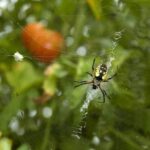Are you struggling to keep deer out of your vegetable garden? Finding the best deer deterrent for vegetable gardens is crucial in protecting your hard-earned harvest.
Deer can cause significant damage to plants, leaving gardeners frustrated and searching for effective solutions. In this article, we will explore the impact of deer on vegetable gardens, natural and physical deterrent options, scent and visual deterrents, electronic options, and other tips and tricks to help you find the best solution for your specific garden needs.
Deer can wreak havoc on vegetable gardens, munching on tender leaves and destroying crops. It’s important to understand the extent of the problem in order to find the best way to keep them at bay. From trampling plants to devouring entire crops, the impact of deer on vegetable gardens can be devastating. This is why finding an effective deterrent is essential in maintaining a thriving garden.
When it comes to keeping deer away from your vegetables, there are a variety of natural options that are safe for both the deer and your garden. From planting specific herbs or flowers that repel deer to using homemade sprays made from natural ingredients, we will explore these methods in more detail. Additionally, we will look into physical barriers such as fencing and structures that can help keep deer out of your garden without causing harm to them.
The Impact of Deer on Vegetable Gardens
Deer can wreak havoc on vegetable gardens, causing devastation to carefully tended plants and crops. Understanding the impact of deer on vegetable gardens is crucial in order to find the best deterrent for protecting your garden. Without adequate measures in place, deer can decimate a garden in a matter of hours, leaving behind a trail of destruction.
The presence of deer in vegetable gardens can result in significant losses for gardeners. Not only do they consume valuable crops, but they also trample and damage plants, leading to reduced yields and potential financial loss. Additionally, deer browsing on plants can disrupt the ecosystem of the garden, impacting the delicate balance of plant and animal life. This makes it vital to find an effective deterrent to keep deer at bay.
To address the problem of deer in vegetable gardens, it’s important to explore various deterrent options that are safe for both deer and the garden. Natural deer deterrents are a popular choice for many gardeners as they do not harm the animals or introduce chemicals into the environment. These methods include using plants with strong scents that repel deer, creating barriers with natural materials, or implementing visual scare tactics that deter deer from entering the garden area.
- Using plants such as lavender, garlic, or chives to repel deer with their strong scents
- Creating physical barriers using materials like netting, fishing line, or thorny branches
- Implementing scare tactics such as reflective objects or motion-activated devices to startle and deter deer
By understanding the impact of deer on vegetable gardens and exploring natural deterrent options, you can take proactive steps to protect your garden from these grazing animals. It’s essential to find the best deer deterrent for your specific garden needs in order to ensure its success and preserve your hard work.
Natural Deer Deterrent Options
When it comes to keeping deer out of your vegetable garden, it’s important to consider natural deterrent options that are safe for both the deer and your plants. Many people want to protect their gardens without causing harm to wildlife, so exploring natural methods is crucial. Here are some natural deer deterrent options to consider:
- Planting deer-resistant plants: One effective way to deter deer from feasting on your vegetables is by planting varieties that they tend to avoid. Some examples include marigolds, lavender, and mint.
- Using homemade sprays: Creating a spray using ingredients like garlic, cayenne pepper, and soap can help keep deer away from your garden. The strong scent and taste of these ingredients are unappealing to deer.
- Attracting natural predators: Encouraging the presence of animals like foxes, coyotes, or dogs can help keep deer at bay. Just be sure to do this in a safe and ethical manner.
By implementing these natural deterrent options, you can protect your vegetable garden without resorting to harmful chemicals or drastic measures.
In addition to the methods mentioned above, there are other natural ways to deter deer from your garden. For example:
- Using human hair or predator urine: Sprinkling human hair or predator urine around the perimeter of your garden can create the illusion of danger for deer, causing them to steer clear of the area.
- Installing motion-activated sprinklers: These devices use sudden bursts of water combined with unexpected movement to startle approaching deer. Over time, they learn that your garden is not a safe place for them.
These methods are effective at keeping deer away while also being environmentally friendly and safe for both your plants and the wildlife in your area. By taking a holistic approach to deterring deer from your vegetable garden, you can find a solution that works best for you and meets your specific needs.
Physical Barriers
When it comes to protecting your vegetable garden from deer, physical barriers like fencing and other structures are often the most effective method. Deer are known for being able to jump high and squeeze through tight spaces, so it’s important to choose the right type of barrier to keep them out.
One of the most popular options for keeping deer out of a vegetable garden is a sturdy fence. The height of the fence should be at least 8 feet tall to prevent deer from jumping over it. Additionally, the spacing between the fence posts should be close enough together to prevent deer from squeezing through. Some gardeners also opt for electric fencing, which gives a mild shock to any animal that comes into contact with it.
Another physical barrier option is using netting or mesh around individual plants or garden beds. This can be an effective way to protect specific areas without having to erect a full fence around the entire garden. Additionally, some gardeners use scarecrow-like structures or motion-activated sprinkler systems to startle deer and discourage them from entering the garden.
Ultimately, finding the best deer deterrent for your vegetable garden will depend on factors such as your budget, garden size, and personal preferences. It’s important to consider all options and choose a method that will both effectively protect your garden and ensure the safety of the deer in your area.
| Deer Deterrent Method | Effectiveness Rating (1-10) |
|---|---|
| 8-foot tall fence | 9 |
| Electric fencing | 8 |
| Netting/mesh | 7 |
Scent Deterrents
Deer are known to have an incredible sense of smell, and certain natural scents can be effective deterrents to keep them out of your vegetable garden. By utilizing scents that are unpleasant to deer, you can effectively deter them from feasting on your crops without causing any harm to the animals or your garden. Let’s explore some of the best natural scents that can be used as deer deterrents in vegetable gardens.
One of the most popular natural scents for repelling deer is human hair. Placing small bags of human hair around the perimeter of your garden can create a barrier that deer will avoid due to the scent. Additionally, predator urine, such as coyote or fox urine, can also be an effective natural deterrent for deer. These scents signal danger to deer and can make them weary of entering your garden.
Furthermore, planting aromatic herbs like lavender, mint, or thyme around your garden can help mask the appealing scent of your vegetables while emitting odors that are displeasing to deer. This not only adds beauty and biodiversity to your garden but also serves a practical purpose in deterring unwanted wildlife. It’s important to note that while these methods have been found to be effective for many gardeners, results may vary depending on the local deer population and environmental factors.
| Natural Deer Deterrent | Effectiveness |
|---|---|
| Human Hair | Effective in creating a barrier |
| Predator Urine | Signals danger to deer |
| Aromatic Herbs | Mask appealing vegetable scents |
Visual Deterrents
When it comes to keeping deer out of your vegetable garden, visual deterrents can be an effective and non-invasive solution. By using scare tactics, you can create an environment that makes deer think twice about entering your garden.
Utilizing Reflective Surfaces
One effective visual deterrent is the use of reflective surfaces. Hanging up strips of aluminum foil, CDs, or other shiny objects around the perimeter of your garden can startle deer and make them hesitant to approach. The reflections and movements of these surfaces mimic the presence of predators, causing deer to avoid the area altogether.
Decoy Animals
Another visual deterrent option is the use of decoy animals. Placing fake predators such as coyotes or owls in strategic locations throughout your garden can create the illusion that there are actual threats present. This can effectively deter deer from entering the area, as they will perceive it as a potential danger.
Motion-Activated Devices
For a more high-tech approach, motion-activated devices such as sprinklers or lights can be utilized as visual deterrents. When triggered by movement, these devices emit sudden bursts of water or flash bright lights, startling any approaching deer and causing them to retreat.
By utilizing these visual deterrent methods, you can effectively keep deer away from your vegetable garden without causing harm to them or your plants. Experiment with different tactics to find the best deer deterrent for your specific garden needs and enjoy a bountiful harvest free from grazing wildlife.
Electronic Deterrents
When it comes to protecting your vegetable garden from deer, electronic deterrents offer a high-tech solution to keep these hungry animals at bay. While natural and physical methods can be effective, electronic deterrents provide a more automated and modern approach to deterring deer from your garden.
One of the most popular electronic deterrent options is motion-activated sprinkler systems. These devices are equipped with sensors that detect movement and then activate a burst of water, startling any deer that may be approaching the garden. The sudden spray of water not only startles the deer but also creates an unpleasant experience for them, encouraging them to stay away from the area.
Another electronic deterrent option is ultrasonic devices, which emit high-frequency sounds that are undetectable to humans but irritating to deer. These devices can be placed strategically around the perimeter of the garden and are activated when they sense movement. The unpleasant sound deters deer from entering the area without causing any harm to them.
In addition to motion-activated sprinklers and ultrasonic devices, there are also electronic deterrents that utilize lights or even predator calls to scare off deer. These high-tech options provide an automated way to deter deer without requiring constant monitoring or physical intervention. When considering the best deer deterrent for vegetable gardens, exploring high-tech electronic options can provide a more hands-off approach to protecting your garden from these unwanted visitors.
Other Tips and Tricks for Deterring Deer From Vegetable Gardens
As any gardener knows, dealing with deer can be a frustrating and challenging aspect of maintaining a vegetable garden. While exploring natural, physical, scent, and visual deterrents is essential in keeping deer at bay, there are also some additional tips and tricks that can help protect your garden from these persistent pests.
One effective method to deter deer from your vegetable garden is to strategically plant certain types of flowers and herbs that naturally repel them. Deer tend to avoid plants with strong scents such as lavender, mint, and yarrow. By incorporating these into your garden layout, you can create a natural barrier that discourages deer from venturing too close to your vegetables.
Another practical tip is to diversify the types of vegetables you grow. While deer may have a penchant for certain crops like lettuce or beans, they might not be as interested in others like tomatoes or peppers. By planting a variety of vegetables, you can minimize the impact of deer browsing on any one specific crop.
In addition to natural planting strategies, it’s important to keep your garden well-maintained and free of enticing food sources for deer. Make sure to clear away fallen fruit, which can attract hungry deer, and promptly remove any weeds or overgrown vegetation where they could potentially hide. Ensuring that your garden is not an easy buffet for visiting deer will go a long way in deterring them effectively.
By implementing these additional tips and tricks in conjunction with other deterrent methods, you can greatly increase the chances of successfully protecting your vegetable garden from the damaging effects of deer browsing. Remember – finding the best deer deterrent for your specific garden requires a combination of strategies tailored to your unique situation.
Conclusion
In conclusion, finding the best deer deterrent for your vegetable garden is crucial in order to protect your plants and ensure a successful harvest. With the impact of deer on vegetable gardens being significant, it is important to explore various options that are safe for both the deer and your garden.
From natural and sustainable methods such as using scent deterrents and visual deterrents to more high-tech options like electronic deterrents, there are plenty of choices available to find what works best for your specific garden needs.
When considering natural deer deterrent options, it’s important to choose methods that will not harm the deer or the environment. Many gardeners have found success with using natural scents such as predator urine or planting strong-smelling herbs and flowers around their garden perimeter. Additionally, visual deterrents such as scare tactics like large motion-activated decoys or even hanging shiny objects can effectively keep deer at bay without causing harm.
For those looking for a more permanent solution, physical barriers such as fencing and other structures provide a reliable way to keep deer out of your vegetable garden. Choosing the right type of barrier will depend on factors such as your budget, the size of your garden, and the level of deer activity in your area.
By carefully considering all available options, you can find the best deer deterrent for your specific garden needs and protect your vegetables from hungry wildlife.
Frequently Asked Questions
What Deters Deer From a Vegetable Garden?
Deer can be deterred from a vegetable garden using physical barriers like fences or netting. Some plants, such as marigolds and lavender, can also act as natural deterrents due to their strong scents.
What Do Farmers Use to Repel Deer?
Farmers use a variety of methods to repel deer from their crops, including the use of commercial deer repellents made from garlic, hot pepper, or rotten eggs. They can also use predator urine or soap bars hung around the perimeter of the fields.
What Smell Do Deer Hate the Most?
The smell that deer hate the most is human scent. They are extremely sensitive to the presence of humans and will avoid areas where they detect human odors. This is why some gardeners suggest regularly rotating scare tactics in order to keep deer on their toes and prevent them from getting comfortable with any particular smell.

If you’re looking to get into vegetable gardening, or are just looking for some tips on how to make your current garden better, then you’ve come to the right place! My name is Ethel and I have been gardening for years. In this blog, I’m going to share with you some of my best tips on how to create a successful vegetable garden.





